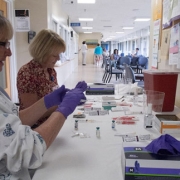Celiac Disease – Research and Development in 2015
 Proposed treatments and potential cures for celiac disease prompted excited discussion at the International Celiac Disease Symposium (ICDS) held in Prague in June 2015. Research in all facets of celiac disease continues at an accelerating pace. Below is a brief survey of what the future might hold, and a starting point for your own research!
Proposed treatments and potential cures for celiac disease prompted excited discussion at the International Celiac Disease Symposium (ICDS) held in Prague in June 2015. Research in all facets of celiac disease continues at an accelerating pace. Below is a brief survey of what the future might hold, and a starting point for your own research!
Presenters wanted to be sure to dispel the following myths:
1. Currently, there are no pharmacological treatments developed or available for celiac disease. Do not fall for the “enzyme”that ‘break down’ gluten. They were emphatically pronounced as ‘unsafe’ for celiacs.
2. Despite reports on the internet, today’s wheat is NOT genetically modified.
 Laboratory Testing The possibility of testing for gluten peptides in urine could tell you whether you may be getting “glutened” without your knowledge. The cost for current test models that are out there is in the range of 10 Euros. There was hope expressed that this could be generally available soon.
Laboratory Testing The possibility of testing for gluten peptides in urine could tell you whether you may be getting “glutened” without your knowledge. The cost for current test models that are out there is in the range of 10 Euros. There was hope expressed that this could be generally available soon.
Genetics According to Dr. Ludvig Sollid of Norway, “Big Pharma” has now taken a big interest in celiac disease because the genetics are similar to other autoimmune diseases. Research is also underway looking at genetically modified gluten as a potential way to make it safe for those with celiac disease.
Vaccines Several vaccines are in the works that may be useful to preventing or treating celiac disease.
Peptide Development for transglutaminate treatment and/or transglutaminase inhibitors could help protect those with celiac.
Polymer Sequestering removing gluten from food, or breaking it down to render it harmless to celiacs
Anti-Autoimmmune Therapies: anti-cytokine therapy (therapy against autoimmune antibodies) and anti-B cell therapy, a strategy already used to treat rheumatoid arththritis and multiple sclerosis.
Blocking Intestinal Homing blocking how leukocytes (white blood feels that attack foreign objects) interact with specific cells of the intestinal lining.
Anti-Inflmmatory Agents anti-inflammatory agents, tight junction modulators, and more.
Topical Steroids treatments seem to hold promise, but the side effects are quite extreme.
An area of research that is not promising to date is making peptides to block the HLA molecule, protecting us from gluten.
Questions? Email [email protected].
 Canadian Celiac Association (CCA) Board Member Mark Johnson and Operations Manager Sue Newell represented the CCA at the International Celiac Disease Symposium (ICDS) held in Prague in June 2015. This report represents their learnings on Understanding of Celiac Disease in Russia and Former Soviet Republics. Learn more about the work of the Canadian Celiac Association at www.celiac.ca.
Canadian Celiac Association (CCA) Board Member Mark Johnson and Operations Manager Sue Newell represented the CCA at the International Celiac Disease Symposium (ICDS) held in Prague in June 2015. This report represents their learnings on Understanding of Celiac Disease in Russia and Former Soviet Republics. Learn more about the work of the Canadian Celiac Association at www.celiac.ca.
If you live in Victoria, Vancouver Islands or the Gulf Islands contact [email protected] or visit Classes for Gluten-Free Living.













